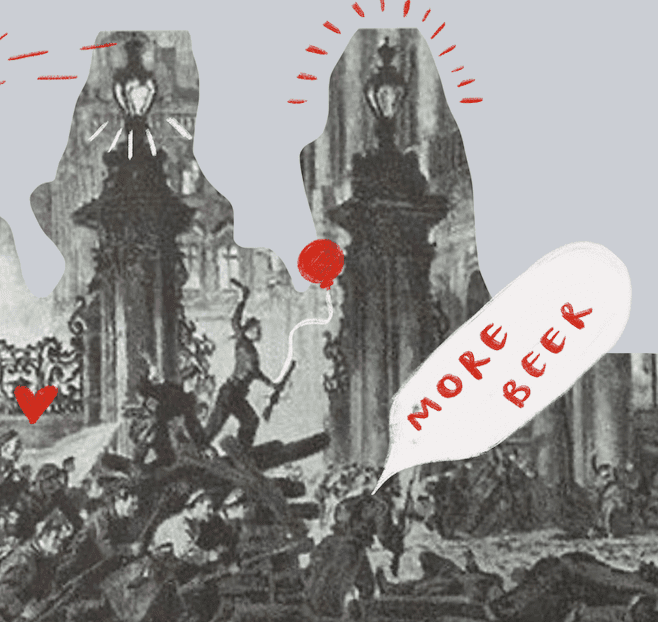How would you explain revolution to a child? The word has several meanings and nebulous connotations. A good way to begin would be visual imagery. Young children typically struggle with figurative explanations, and older children are notoriously superficial. School history textbooks often contain depictions such as the storming of the Winter Palace or the Reichstag Fire. This is presumably because the infamously capitalist educational publishing industry understands the preferences of schoolchildren. They want to see violence, blood, impassioned speeches, fire, dishevelled mobs, and – above all – drama.
Australia’s own history of revolution is comparatively sparse, and its legacy rather more symbolic than substantial. The blazing white Southern Cross flag of the Eureka Stockade is a vivid symbol recalling one such moment in our history. It’s no wonder that it is a favourite topic to be briefly mentioned and immediately forgotten in school classrooms: it birthed a cool flag. How is that event explained to children? From what I recall from my school history classes, it had something to do with angry Irishmen. That seems to be a recurring theme of British imperial history. But do our children actually understand it, and what the Stockade meant for our democracy? Few of us could identify that the Stockade was a pivotal moment in the fight for suffrage and workers’ rights, but I daresay many more would associate it with binge drinking No Voters on Australia Day. Incidentally, Americans have a similar proclivity to celebrate the flags of rebel movements, though their rebel flag of choice is probably a tad more morally dubious.
Important as the Eureka Stockade was for democracy and the labour movement in Australia, it overshadows the colourfully named Rum Rebellion in our school curricula. The only successful coup d’etat in Australian history, the Rum Rebellion saw the New South Wales Corp, military arm of the nascent colony, overthrow and banish the notorious Governor William Bligh. Assuming the alliterative name is insufficient to inspire a cursory Wikipedia search, the gist of the Rum Rebellion was that Bligh, already famous for having been thrown off a ship, was forced by a corrupt state institution to leave Sydney on a ship for disrupting the equally infamous John MacArthur’s illegal merchant monopoly in New South Wales. It is a testament to the failings of our education system that the two critical lessons of the Rum Rebellion are lost on our schoolchildren: firstly, that there is a long history of capitalist corruption in our country; secondly, that Australians do terrible things when deprived of cheap alcohol.
It is a shame that our children miss such important lessons from history. They are rather more inclined to focus on the flashy elements of history; as it happens, this inclination is not limited to children. One has to only read a cinema programme or briefly scroll through their streaming app of choice to observe how history has been commodified by Hollywood executives who command small armies of underpaid writers and filming crews from their golden palaces on the cliffs of Malibu. The greedy elites of Hollywood need only lift a finger, and every television screen in your vicinity will blaze with increasingly expensive reenactments of D-Day or episodic portrayals of the sex lives of British monarchs.
Is this what we want? One rarely sees productions of the struggles of coal miners, or hospital workers, or of oppressed women and minorities, or of the working classes. It’s all glitz and gore – we instead are bombarded with steady streams of works glamourising the lives of royals and aristocrats. We all know what Marie Antoinette supposedly remarked upon learning that her impoverished subjects had no bread to eat – but what did those starving French peasants cry in their dying breaths? We don’t know, and we certainly won’t learn from a star-studded Netflix show. The silencing of lower classes is sickening, and cannot be seen as anything else but plutocratic propaganda.
The threat to future generations is twofold. The media hides the iniquities of history from our children, and it is conspicuously clear that our education system is failing in its presentation of the brave actions of revolutionaries. The media’s deleterious effect on the education system is palpable: not only do our schools marginalise the voices of the struggling working classes, they cannot even conduct Year 12 examinations without poisoning the innocent minds of our children with blatant revisionism. Even while I was at school, the bourgeois institution which conducts Victoria’s VCE examinations shamelessly included an altered version of Nikolai Kochergin’s Storming of the Winter Palace in the 2012 History of Revolutions final exam. The alteration made to Kochergin’s illustration was the insertion of a 100-foot tall mechatronic battle robot.
A call to action has emerged. The quality of education in Australia is unacceptable. Our young students are not being taught about the oppression of the landowners. They are not being taught about the excesses of the clergy and aristocracy. They are not being taught about the potential for a utopia, free of the shackles of class and wealth. They are being taught about robots.
The truth is clear. We must re-educate our children.
Think your name would look good in print? Woroni is always open for submissions. Email write@woroni.com.au with a pitch or draft. You can find more info on submitting here.
We acknowledge the Ngunnawal and Ngambri people, who are the Traditional Custodians of the land on which Woroni, Woroni Radio and Woroni TV are created, edited, published, printed and distributed. We pay our respects to Elders past and present. We acknowledge that the name Woroni was taken from the Wadi Wadi Nation without permission, and we are striving to do better for future reconciliation.
